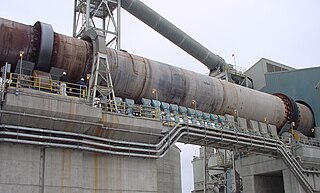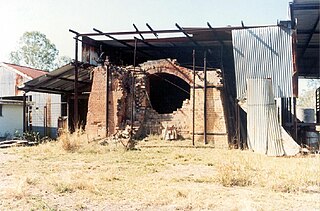
A cement is a binder, a chemical substance used for construction that sets, hardens, and adheres to other materials to bind them together. Cement is seldom used on its own, but rather to bind sand and gravel (aggregate) together. Cement mixed with fine aggregate produces mortar for masonry, or with sand and gravel, produces concrete. Concrete is the most widely used material in existence and is behind only water as the planet's most-consumed resource.

Slag is a by-product of smelting (pyrometallurgical) ores and used metals. Broadly, it can be classified as ferrous, ferroalloy or non-ferrous/base metals. Within these general categories, slags can be further categorized by their precursor and processing conditions.

In materials science, a refractory material or refractory is a material that is resistant to decomposition by heat, pressure, or chemical attack, and retains strength and form at high temperatures. Refractories are polycrystalline, polyphase, inorganic, non-metallic, porous, and heterogeneous. They are typically composed of oxides or carbides, nitrides etc. of the following materials: silicon, aluminium, magnesium, calcium, boron, chromium and zirconium.

The cementation process is an obsolete technology for making steel by carburization of iron. Unlike modern steelmaking, it increased the amount of carbon in the iron. It was apparently developed before the 17th century. Derwentcote Steel Furnace, built in 1720, is the earliest surviving example of a cementation furnace. Another example in the UK is the cementation furnace in Doncaster Street, Sheffield.

A fire brick, firebrick, or refractory is a block of ceramic material used in lining furnaces, kilns, fireboxes, and fireplaces. A refractory brick is built primarily to withstand high temperature, but will also usually have a low thermal conductivity for greater energy efficiency. Usually dense firebricks are used in applications with extreme mechanical, chemical, or thermal stresses, such as the inside of a wood-fired kiln or a furnace, which is subject to abrasion from wood, fluxing from ash or slag, and high temperatures. In other, less harsh situations, such as in an electric- or natural gas-fired kiln, more porous bricks, commonly known as "kiln bricks", are a better choice. They are weaker, but they are much lighter and easier to form and insulate far better than dense bricks. In any case, firebricks should not spall, and their strength should hold up well during rapid temperature changes.

Oughtibridge is a residential village in the north of Sheffield within the bounds of Bradfield civil parish. The village stands 5 miles (8 km) north-west of the city centre in the valley of the River Don. The population of the village has increased significantly in recent years due to much private housing development and stood at 3,542 in 2006 over an area of 355 hectares. The population of Oughtibridge increased to 3,584 in 2011.

Investment casting is an industrial process based on lost-wax casting, one of the oldest known metal-forming techniques. The term "lost-wax casting" can also refer to modern investment casting processes.
Metakaolin is the anhydrous calcined form of the clay mineral kaolinite. Minerals that are rich in kaolinite are known as china clay or kaolin, traditionally used in the manufacture of porcelain. The particle size of metakaolin is smaller than cement particles, but not as fine as silica fume.

Sinosteel Corporation is a state-owned enterprise, primarily in mining, trading, equipment manufacturing and engineering. Founded in 1993 and based in the People's Republic of China, it is the country's second largest importer of iron ore. The company used to be under the direct supervision of the State-owned Assets Supervision and Administration Commission. In 2022, it was acquired by state-owned steel conglomerate Baowu.

Cement kilns are used for the pyroprocessing stage of manufacture of portland and other types of hydraulic cement, in which calcium carbonate reacts with silica-bearing minerals to form a mixture of calcium silicates. Over a billion tonnes of cement are made per year, and cement kilns are the heart of this production process: their capacity usually defines the capacity of the cement plant. As the main energy-consuming and greenhouse-gas–emitting stage of cement manufacture, improvement of kiln efficiency has been the central concern of cement manufacturing technology. Emissions from cement kilns are a major source of greenhouse gas emissions, accounting for around 2.5% of non-natural carbon emissions worldwide.

A raw mill is the equipment used to grind raw materials into "rawmix" during the manufacture of cement. Rawmix is then fed to a cement kiln, which transforms it into clinker, which is then ground to make cement in the cement mill. The raw milling stage of the process effectively defines the chemistry of the finished cement, and has a large effect upon the efficiency of the whole manufacturing process.
China National Materials Group or Sinoma, established in 1983, is a central government-administered enterprise directly under the administration of the State-owned Assets Supervision and Administration Commission of the State Council of the People's Republic of China. It is the world's largest cement equipment and engineering service provider and China's leading non-metal materials manufacturer. It is also the only enterprise that possesses a series of core technologies and complete innovation system in non-metal materials industry in China.

Friden is a hamlet in the civil parish of Hartington Nether Quarter, Derbyshire, England. It is 11 miles (18 km) south-east of Buxton, just off the Newhaven to Cromford Via Gellia road, and lies within the Peak District National Park.
Co-processing is the use of waste as raw material, or as a source of energy, or both to replace natural mineral resources and fossil fuels such as coal, petroleum and gas in industrial processes, mainly in energy intensive industries (EII) such as cement, lime, steel, glass, and power generation. Waste materials used for Co-processing are referred to as alternative fuels and raw materials (AFR).

Brickworks is Australia's largest brick manufacturer, consisting of four divisions – Building Products Australia, Building Products North America, Industrial Property, and Investments.
Calderys, a subsidiary of Imerys, is a multinational company specialized in producing heat resistant monolithic refractory products. Calderys is headquartered at Issy-Les-Moulineaux on the outskirts of Paris, with over 2,000 employees and 18 plants in more than 30 countries.

The LASSELSBERGER Group is an international producer of raw materials, building materials and tiles based in Pöchlarn. Both local home markets and international markets - especially in Western Europe - are supplied from the production sites in Central and Eastern Europe. The subsidiaries of the three divisions Ceramics, Building Materials and Minerals as well as the local organizations are managed and coordinated from Pöchlarn. The term "LASSELSBERGER Group" represents the umbrella term for all corporate components of Lasselsberger GmbH.

The Clackline Refractory, also known as Clackline Clay and Brick, is a heritage listed brickworks site in Clackline, Western Australia.

Pindi Pindi Brickworks is a heritage-listed former brickworks off the Bruce Highway, Pindi Pindi, Mackay Region, Queensland, Australia. It was built in 1933. It is also known as Evans Firebricks Ltd and Pindi Pindi Firebricks Company. It was added to the Queensland Heritage Register on 27 October 2000.
The cement industry in the United States produced 82.8 million tonnes of cement in 2015, worth US$9.8 billion, and was used to manufacture concrete worth about US$50 billion. The US was the world's third-largest producer of cement, after China and India. The US cement industry includes 99 cement mills in 34 states, plus two plants in Puerto Rico. The industry directly employed 10,000 workers in 2015. Ten percent of the cement used in the United States in 2015 was imported.














